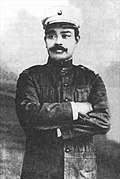From Wikipedia, the free encyclopedia
Portals : Arts — Biography — Geography — History — Mathematics — Science — Society — Technology — Other portals Featured Portal of the Week : {{Portal of the Week (Week 23 of 2025)}}
The southern entrance
Trafford Park Metropolitan Borough of Trafford , Greater Manchester , England, opposite Salford Quays on the southern side of the Manchester Ship Canal , 3.4 miles (5.5 km) southwest of Manchester city centre . Until the late 19th century, it was the ancestral home of the Trafford family, who sold it to financier Ernest Terah Hooley in 1896. It was the first planned industrial estate in the world and remains the largest in Europe, at 4.7 square miles (12 km2 ). Trafford Park was a major supplier of materiel in the First and Second World Wars, producing the Rolls-Royce Merlin engines used to power both the Spitfire and the Lancaster . At its peak in 1945, an estimated 75,000 workers were employed in the park. Employment began to decline in the 1960s as companies closed in favour of newer, more efficient plants elsewhere. The new Manchester Metrolink line from Pomona to the Trafford Centre opened in 2020. (Full article...
Antimonumento 49 ABC
... that sculptures of children's shoes at the Antimonumento 49 ABC (pictured) —honoring those killed in a fire—were later stolen?
... that marmalade, mashed potato and fish knives were all used in the book Class
... that until the 1990s, linguists often confused the Nizaa language
... that Julian Yacoub Mourad Syriac Catholic Church , escaped from the Islamic State after being held captive for more than four months?
... that the role of the British Mobile Defence Corps
... that the chairman of the board of a Texas TV station
... that Tyla became the second female African artist to score multiple solo entries on the Billboard Hot 100Push 2 Start
... that pianist Phyllis Chen toy piano after both her arms became sore from tendinopathy ?
... that Welwitschia mirabilis
Lee Jae-myung
June 5 World Environment Day Day of Arafah
Antonio Luna
1897 – The Ancient Temples and Shrines Preservation Law was passed, instituting the protection of structures and artifacts in Japan designated National Treasures 1899 – Antonio Luna (pictured) , Commanding General of the Philippine Army , was assassinated in the midst of the Philippine–American War .1997 – Anticipating a coup attempt, President Pascal Lissouba of the Republic of the Congo ordered the detention of his rival Denis Sassou Nguesso , initiating a second civil war 2004 – Noël Mamère , the mayor of Bègles , conducted a marriage ceremony for two men, even though same-sex marriage in France 2009 – After almost two months of civil disobedience National Police and indigenous people in Bagua province , Peru.






